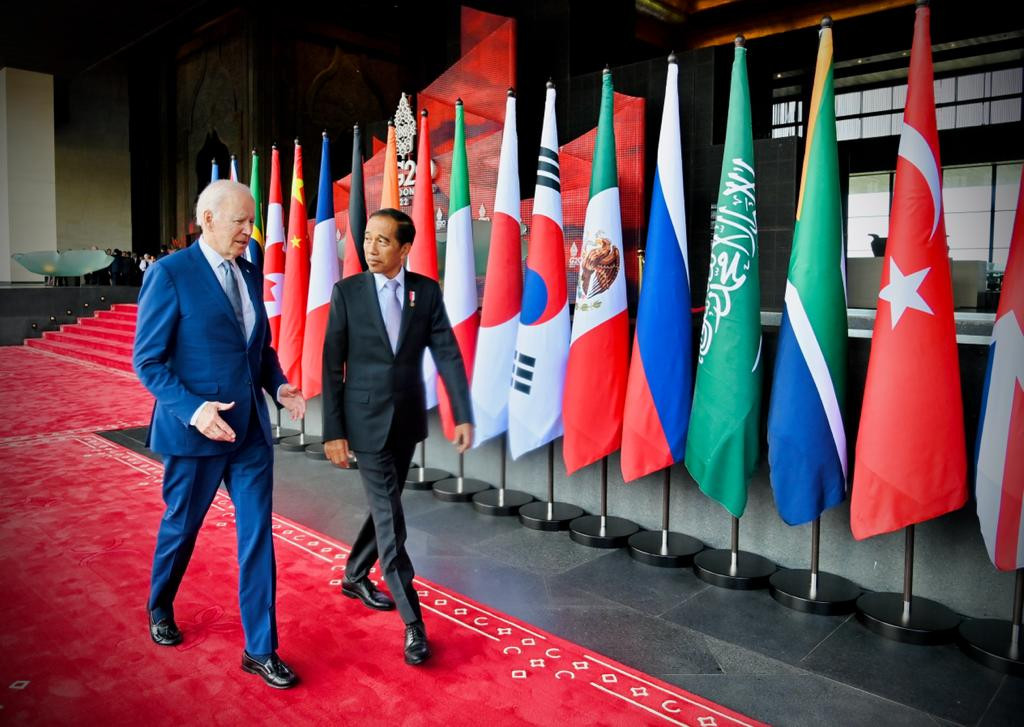Jokowi’s international outlook still ‘too narrow’
President Jokowi is facing growing criticism for his brand of economic nationalism, which is getting in the way of Indonesia's broader political-security interests in the wider Indo-Pacific region.
Change text size
Gift Premium Articles
to Anyone

I
n his State of the Nation address this year, President Joko “Jokowi” Widodo made a big fuss about how much “international trust” Indonesia has gained over the years.
He touted the success of Indonesia’s Group of 20 presidency last year amid sharpening global rivalries, as well as its ongoing chairmanship of ASEAN, as examples of Indonesia, a growing “middle power”, being able to convene the world’s major powers at the same table, on home turf.
Jokowi emphasized that this rise in the nation’s global stature should not be squandered. He even sought to level with ordinary Indonesians by acknowledging that, while this trust cannot be consumed by them in the same way rice can, it remains a key aspect in safeguarding national interests espoused in the 2045 Golden Indonesia vision.
This vision imagines Indonesia as the world’s fifth-largest economy in the next 20 years, achieved, by among other methods, downstreaming its critical minerals industry and leveraging its demographic dividend to develop human capital.
“With a high level of international trust, our credibility will be even more acknowledged and our sovereignty even more respected. Indonesia’s voice will be heard, making it easier for us to negotiate,” the President asserted.
Later on in his speech on the proposed 2024 state budget, he is interpreted by some as hedging against external risks by bolstering the nation's inner strength.
And while this speech may neatly encapsulate the foreign policy aspects of nearly nine years of “Jokowinomics”, as some analysts have suggested, the tendency to prioritize economic gains over regional and global stability runs the risk of backfiring on its domestic interests, others argue.
“I think, in Jokowi’s head, when he was speaking about international trust, he was referring to the trust that Indonesia cannot be dictated to by larger powers and the trust that means Indonesia is worth investing in,” Ahmad Rizky M. Umar, an international relations expert from the University of Queensland, told The Jakarta Post on Friday.
“It is a narrow definition, in my opinion.”
Tunnel vision
For the most part of his two-term administration, Jokowi gained a reputation for being a domestic-minded leader, the opposite of his predecessor Susilo Bambang Yudhoyono, a former military general with lofty global ambitions.
This became evident in his avoidance of attending far-flung international conferences such as the United Nations General Assembly. He has not even been on a state visit to the United States, a major partner of Indonesia.
But the President’s interest in foreign policy eventually grew, especially in economic forums such as the G20. After successfully hosting the G20 Summit in Bali, he began incorporating more diplomacy into his economic visions, including by naming banker-turned-bureaucrat Pahala Mansury as deputy foreign minister last month.
He is also heading to Africa next week, reportedly to make good on his instruction to expand Indonesia’s trade and investment portfolio to so-called “nontraditional markets”. While there, he is expected to attend the BRICS (Brazil, Russia, India, China, South Africa) Summit.
Furthermore, Jokowi appears to be standing his ground on other economic interests too. For instance, his critical-minerals downstreaming agenda, which seeks to turn Indonesia into an electric vehicle battery (EVB) hub by leveraging its abundant nickel reserves, was put among the Foreign Ministry’s top diplomatic priorities this year.
This mission, which Foreign Minister Retno LP Marsudi described as defending the country’s “economic sovereignty” in a speech in January, follows disapproval from the European Union and an eventual World Trade Organization (WTO) ruling against Jakarta’s plans.
The nickel dispute has driven a wedge between the EU and Indonesia, with Jokowi last year accusing Brussels of “modern colonialism”.
Free, not active
Last month, the Jokowi administration also faced sharp criticism for a cabinet reshuffle that was perceived to have negatively affected the US-Indonesia relationship, with the third consecutive early withdrawal of an Indonesian envoy to the US. At that time, the ambassador in Washington, DC Rosan Roeslani was appointed deputy state-owned enterprises (SOEs) minister.
The move was regarded by some as a diplomatic snub to the US. A few weeks later, reports emerged that US President Joe Biden might skip the ASEAN Summit in Jakarta next month, also taken as a slight by analysts.
The US has not provided any further explanation about Biden’s travel plans and referred to Secretary of State Antony Blinken’s bilateral meeting with Foreign Minister Retno in July, during which “both sides exchanged views on innovative means to elevate bilateral relations”.
Rosan is expected to stay in Washington until the end of the year, while his counterpart in Jakarta, Sung Kim, is also ending his term as US envoy to Indonesia around the same time.
Jokowi’s blatant pursuit of economic interests has drawn a fair amount of criticism, with many urging Jakarta not to injure its global political and security interests by snubbing international actors from whom it perceives it cannot profit.
That the President used the term “international trust” in his speech as a modality for domestic interests was proof that he is still very much inward-looking, said Andrew Mantong, an international relations expert from the Centre for Strategic and International Studies (CSIS) in Jakarta.
“When it comes to a ‘free and active’ foreign policy, Jokowi clearly aligns with the ‘free’ part as being able to do as he wishes without practicing the ‘active’ bit, where he makes clear stances on the current geopolitical landscape. But you can’t have one and not the other,” Andrew told the Post.
“Will Indonesia’s golden moment come when ASEAN is divided? Will his downstream plans take off without considering the external aspects of the supply chain and securitization of the global economy?” (tjs)









